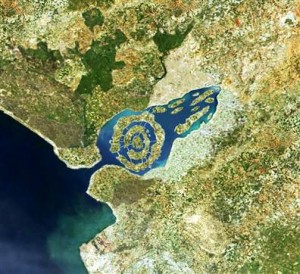 There was glop on the windows of the International Space Station. Outside. It was algae. How? Now that is unclear, but there is a recent tradition of arguing against abiogenesis here on Earth and arguing for ideas like panspermia where biological material keeps raining down on the planet, carried by comets and meteorites, trapped in crystal matrices. And there may be evidence that some of that may have happened, if only in the local system, between Mars and Earth.
There was glop on the windows of the International Space Station. Outside. It was algae. How? Now that is unclear, but there is a recent tradition of arguing against abiogenesis here on Earth and arguing for ideas like panspermia where biological material keeps raining down on the planet, carried by comets and meteorites, trapped in crystal matrices. And there may be evidence that some of that may have happened, if only in the local system, between Mars and Earth.
Panspermia includes as a subset the idea of Directed Panspermia whereby some alien intelligence for some reason sends biological material out to deliberately seed worlds with living things. Why? Well, maybe it is a biological prerogative or an ethical stance. Maybe they feel compelled to do so because they are in some dystopian sci-fi narrative where their star is dying. One last gasping hope for alien kind!
Directed Panspermia as an explanation for life on Earth only sets back the problem of abiogenesis to other ancient suns and other times, and implicitly posits that some of the great known achievements of life on Earth like multicellular forms are less spectacularly improbable than the initial events of proto-life as we hypothesize it might have been. Still, great minds have spent great mental energy on the topic to the point that elaborate schemes involving solar sails have been proposed so that we may someday engage in Directed Panspermia as needed. I give you:
So we take solar sails and bioengineered lifeforms in tiny capsules. The solar sails are large and thin. They carry the tiny capsules into stellar formations and slow down due to friction.… Read the rest
